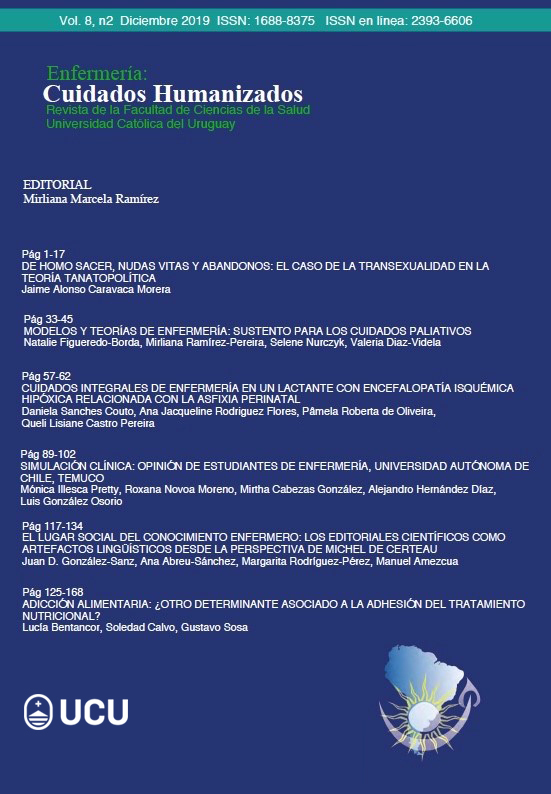MODELOS Y TEORÍAS DE ENFERMERÍA: SUSTENTO PARA LOS CUIDADOS PALIATIVOS
DOI:
https://doi.org/10.22235/ech.v8i2.1846Palabras clave:
Modelo de Enfermería, Teoría de la Enfermería, Cuidados PaliativosResumen
El cuidado es la base de la ciencia de enfermería y puede conceptualizarse como todas las acciones que ayudan a preservar y mantener la vida. Se origina en la necesidad de supervivencia humana en circunstancias adversas, y si bien es inherente a la especie, se ha diferenciado por género. Las necesidades de cuidado familiar, alimentos, ropa y afecto se han relacionado históricamente con las mujeres; en el caso de los hombres, la atención se relaciona con actos que requieren fuerza física y el logro de alimentos a través del trabajo de caza y pesca. La enfermería moderna tomó desde sus orígenes la práctica del cuidado como la base de su disciplina, siendo abordada desde varios aspectos, en los que se incluye: atención, investigación, docencia y gestión. El cuidado es una parte específica de la cultura, los valores y las creencias de las personas, poniendo a la preocupación por los demás como el pilar de la existencia humana. Cuidar es una forma de vivir y de estar en relación con otros, de habitar en el mundo, que es esencial para cualquier adaptación. Desde la perspectiva de la Enfermería en Cuidados Paliativos, hay varios modelos de enfoques para una intervención holística, que combinan aspectos físicos, sociales, psicológicos y espirituales que brindan atención a la familia y a la sociedad en general. El objetivo de este artículo es identificar la utilización de los modelos y teorías de enfermería en los cuidados paliativos.
Descargas
Citas
Word Health Organization. Key facts (Internet) 2018 Available from: https://www.who.int/news-room/fact-sheets/detail/palliative-care (Accessed: 2019-06-22)
International Council of Nursing. Definition of Nursing. (Internet) 2002 Avalaible from: https://www.icn.ch/nursing-policy/nursing-definitions (Accessed: 2019-06-22)
Raile M. Nursing Theorists and Their Work. 8ª ed. Madrid: Elsevier Mosby; 2015. 829p. DOI: 10.1080/15524256.20 11.593152
Hain,D. & Haras S. Changing Nephrology Nurses' Beliefs about the Value of Evidence-Based Practice and Their Ability to Implement in Clinical Practice. Nephrology Nursing Journal 2015; 42: 563-566. ISSN: 1526744X
Bornem T. Palliative Care Nursing. Current problems in cancer . 2011; 35: 351-356. DOI: 10.1016/j.currproblcancer.2011.10.009
De Arco-Canoles OdelC, Suarez-Calle ZK. Rol de los profesionales de enfermería en el sistema de salud colombiano. Univ. Salud.2018;20(2):171-182. DOI: http://dx.doi.org/10.22267/rus.182002.121
Hagan TL. Nursing's role in leading palliative care: A call to action. Nurs Educ Today. 2018; 61: 216-19. DOI: 10.1016/j.nedt.2017.11.037.
Johnston B. Dignity-conserving care in palliative care setting: An integrative review. Journal of Clinical Nursing.2015; 24:1743-1772. DOI: 10.1111/jocn.12791
Östlund U. How to conserve dignity in palliative care: suggestions from older patients, significant others, and healthcare professionals in Swedish municipal care. BMC Palliative Care. 2019; 18:10. Available from: https://doi.org/10.1186/s12904-019-0393-x (Accessed 2019-06-23).
Crossetti MGO. Revisão integrativa de pesquisa na enfermagem o rigor cientifico que lhe é exigido (editorial). Rev Gaúcha Enferm., Porto Alegre (RS) 2012 jun;33(2):10-11.
Mamédio C, Andrucioli C, Cuce M. Estrategia PICO para la construcción de la pregunta de Investigación y la búsqueda de evidencia. Rev Latino-am Enfermagem. 2007; 15(3): 508-511.
Karlsson M. Community nurses' experiences of ethical problems in end-of-life care in the patient's own home. Scandinavian Journal of Caring Sciences.2013; 27:831-838. DOI: 10.1111/j.1471-6712.2012.01087
Contreras S. Los pacientes del programa alivio del dolor y cuidados paliativos: razones y significados para enfermeras/os. (Patients of the pain relief and palliative care programme: reasons and meaning for nurses) Cienc. Enferm. 2016; 22: 47-63. DOI: 10.4067/S0717-95532016000100005.
Dobrina R. An overview of hospice and palliative care nursing models and theories. International Journal of Palliative Care, 2014; 20: 75-81. DOI: 10.12968/ijpn.2014.20.2.75
Perez M.E. Perspectiva de la enfermera ante el paciente oncológico en fase terminal en Tampico, Tamaulipas, México. (Perspective from the nurse to the terminal cancer patient in Tampico, Tamaulipas, Mexico) Cultura de los Cuidados. 2011; 30: 52-59 DOI: 10.7184/cuid.2011.30.08
Adams J. Nursing Roles and Strategies in End-of-Life Decision Making in Acute Care: A Systematic Review of the Literature. Research and Practice 2011; Article ID 527834, 15 pages. DOI: 10.1155/2011/527834
Pina P. Self-care: Orem’s theoretical contribution to the Nursing discipline and profession Revista de Enfermagem Referência. 2014. 4:157-163 DOI: 10.12707/RIV14081
Johnston et al. An exploration of self-management support in the context of palliative nursing: a modified concept analysis BMC Nursing 2014; 13:13:21. DOI: 10.1186/1472-6955-13-21
Figueiredo de Sá França R. The importance of communication in pediatric oncology palliative care: focus on Humanistic Nursing Theory Rev. Latino-Am. Enfermagem. 2013; 21 :780-6. DOI: 10.1590/S0104-11692013000300018
Wu H. L. & Volker D. L. Humanistic Nursing Theory: application to hospice and palliative care. Journal of advanced nursing.2012; 68: 471-479. DOI: 10.1111/j.1365-2648.2011.05770.
Figueiredo de Sá França R. Importance of Palliative Care in Pediatric Oncology. International Archives of Medicine.2016; 9: 1-10. DOI: 10.1590/S0104-11692013000300018.
Oberle K & Davies B. Support and caring: exploring the concepts. Oncology Nursing Forum.1992; 19: 763–767
Newton J. Evaluation of the currency of the Davies and Oberle (1990) model of supportive care in specialist and specialised palliative care settings in England. Journal of Clinical Nursing. 2014. 23: 1662–1676 DOI: 10.1111/jocn.12301.
Badr Naga B. Roy Adaptation Model: Application of Theoretical Framework. Middle east journal of family medicine, Middle East Journal of Family Medicine.2014; 12: 48-51
Fazel Asgarpoor, A. The effect of a care plan based on the Roy Adaptation Model on level of Fatigue in hemodialysis patients. Evidence Based Care.2011. 1: 77-90. DOI: 10.22038/ebcj.2011.3766
Shahed S. Effect of an Educational-Supportive Program Based on Roy Adaptation Model on Marital Satisfaction in Mastectomy Patients Receiving Chemotherapy Journal of Evidence-based Care. 2016; 6: 71-78 DOI: 10.22038/ebcj.2016.6744
Desbiens, J. Gagnon. Development of a shared theory in palliative care to enhance nursing competence. Journal of Advanced Nursing.2012; 68: 2113-2124. DOI: 10.1111/j.1365-2648.2011.05917
Sedillo R A pilot study of palliative care provider self-competence and priorities for education in Kenya. Journal of Hospice & Palliative Nursing. 2015; 17: 356–363. DOI: 10.1097/NJH.0000000000000176 .
Descargas
Publicado
Cómo citar
Número
Sección
Licencia
Derechos de autor 2019 Enfermería: Cuidados Humanizados

Esta obra está bajo una licencia internacional Creative Commons Atribución 4.0.

















